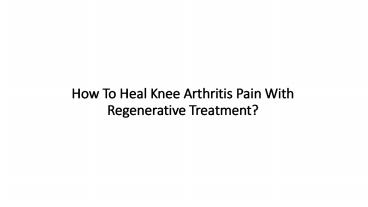How To Heal Knee Arthritis Pain With Regenerative Treatment?
Title:
How To Heal Knee Arthritis Pain With Regenerative Treatment?
Description:
If you have arthritis in your knee, platelet rich plasma therapy may help. It uses parts of your own blood to help your body heal itself. PRP can help your knee feel better and work better. The process begins with a sample of your blood. –
Number of Views:9
Title: How To Heal Knee Arthritis Pain With Regenerative Treatment?
1
How To Heal Knee Arthritis Pain With Regenerative
Treatment?
2
- Knee pain is a very common symptom prevalent
among not only the elders but also the younger
ones. Arthritis is the most common cause of knee
pain. - There are two types of knee arthritis such as
osteoarthritis and rheumatoid arthritis. - Osteoarthritis is a degenerative condition,
otherwise called wear-and-tear arthritis. - The cartilage gives a cushion-like effect between
the bone joints. - In osteoarthritis, wear and tear activities
remove the cartilage gradually.
3
- Hence, joint bones run against each other, which
leads to knee pain. In rheumatoid arthritis, the
immune system attacks itself by damaging the
cartilage. - As and when the knee pain becomes severe, the
muscles around the affected knee portion weaken.
Hence, this condition leads to joint deformity
where the knee shape may point inwards or
outwards. - Knee arthritis not only causes pain.
- It is also accompanied by other symptoms like
tenderness, limited range of motion, stiffness,
swelling, warmth sensation and cracking noise,
especially while climbing the steps.
4
Causes of Knee Arthritis
- Knee arthritis is more common among females
compared to males. - The varied causes of knee arthritis include
previous joint injuries, trauma, obesity, bone
deformities, strenuous activities with repetitive
movements, genetics, family history, Vitamin D
and calcium deficiency. - Over secretion of growth hormone and iron
overload increase the risk to develop knee
arthritis.
5
Diagnosis of Knee Arthritis
- Knee arthritis can be diagnosed by performing a
physical examination and an X-ray scan. - If the pain is severe, the physician may opt for
an MRI scan for a detailed examination of bones,
cartilage and soft bones. - The physician will suggest a synovial fluid
examination or blood test to detect rheumatoid
arthritis.
6
Treatment for Knee Arthritis
- The preliminary treatment measures for knee pain
include R.I.C.E. therapy and medications to
control the symptoms and avoid further joint
damage. - The home-based treatment named R.I.C.E. formula
comprises of Rest, Ice therapy, Compression and
Elevation. - Medications such as analgesics and non-steroidal
anti-inflammatory drugs (NSAIDs) provide only
short-term relief. - If the pain continues, the physician may
recommend the administration of corticosteroid
injections, but they can also provide only
temporary relief with few side effects. - Prolonged use of corticosteroid injections will
suppress the bodys natural healing mechanism,
and the patient may end up with knee replacement
surgery.
7
- Regenerative treatment can put an end to your
long-lasting symptoms by repairing the damaged
cells and restoring the normal function. - Regenerative therapy is a non-surgical procedure
with minimal downtime. - It enhances recovery within a short period by
stimulating your bodys healing mechanism
naturally. - The regenerative treatment has no side effects
since it involves your own stem cells or blood
cells. - Hence, there is neither any rejection issues nor
any cross-transmission of disease.
8
- Regenerative treatment includes Platelet Rich
Plasma (PRP) therapy, Prolotherapy, SVF (Stromal
Vascular Fraction) cell therapy and Mesenchymal
cell therapy. - It is essential to treat the cause of the
disease, instead of suppressing the related
symptoms. - This is where regenerative treatment proves to be
safe and effective it naturally treats the
underlying cause.
9
- For more information about the regenerative
treatment for knee pain, You can also contact
Medica Stem Cells clinic in London to learn more
about the types of regenerative cell therapies,
PRP Treatment in London available in the UK to
treat knee arthritis.































